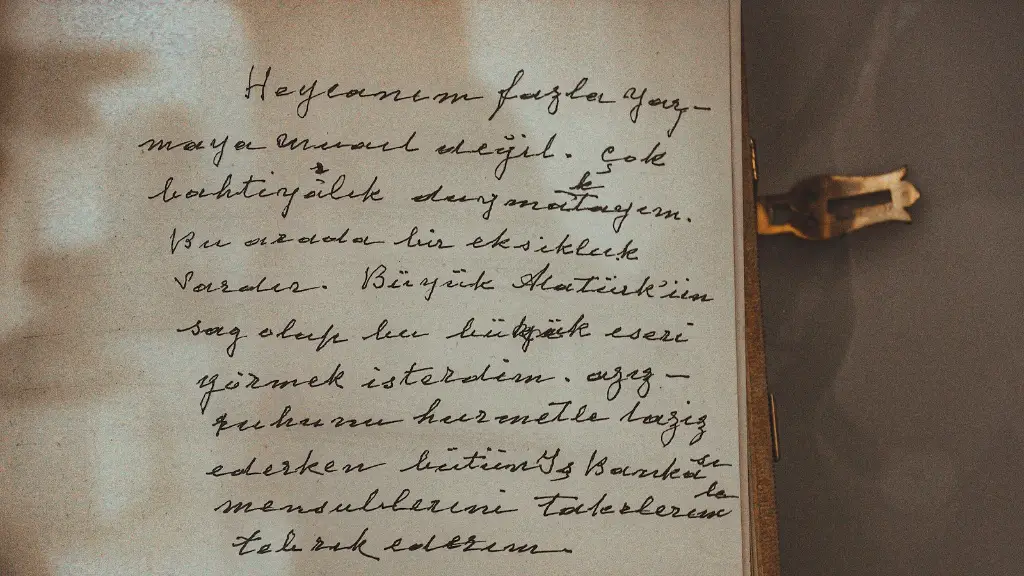The poem “Dream Deferred” by Langston Hughes is a powerful poem that speaks to the experience of African Americans in the United States. The poem was originally published in 1951 in his book Montage of a Dream Deferred, which was inspired by his work with the civil rights movement. The title of the poem comes from the opening line, “What happens to a dream deferred?”. The poem explores the idea of what happens when a person’s dreams and hopes are denied. In the poem, Hughes addresses the idea that the dreams of African Americans were deferred or put off due to discrimination and racism. He also conveys the idea that dreams could be taken away or forgotten if they were forgotten or not attended to.
Hughes’ poem captures the feelings of isolation and deprivation that were so pervasive in the lives of African Americans during this time period. The poem speaks to the idea of hope and despair, as it examines how people cope when their dreams are deferred. It is a powerful expression of the frustration and anger that many African Americans experienced at the time. The poem does not simply look at what it means to have a dream deferred, but rather looks at the impact that this dream can have on a person’s life.
The poem is written in the form of a series of rhetorical questions, which express the narrator’s confusion and concern about the fate of his dreams. By using a series of questions, Hughes is able to explore the different possibilities of what can happen when a dream is deferred. He focuses on the frustration, anger, and despair that come with a deferred dream. By the end of the poem, the narrator is left feeling even more powerless and frustrated, unable to come to terms with the situation.
The poem is representative of a larger cultural phenomenon, which is the idea of the “American Dream.” This is the idea that anyone, including African Americans, can achieve success and prosperity if they work hard and follow their dreams. This dream is still elusive for many African Americans, who experience racism, discrimination and economic inequality on a daily basis. Hughes’ poem speaks to the frustration of African Americans who have been denied access to the “American Dream” and are left with no other option than to keep dreaming.
The poem also speaks to another cultural concept: the “American Nightmare.” This is the idea that the dreams of African Americans can be deferred or denied, leading to despair and hopelessness. Hughes’ poem explores this idea by painting a vivid picture of what happens when dreams are deferred. He conveys the despair and the sense of hopelessness that comes with deferred dreams. He also speaks to the idea of resilience and hope, as he urges African Americans to keep dreaming even when their dreams seem out of reach.
The poem speaks to the social implications of having dreams deferred. Hughes speaks to the idea that African Americans, who were historically oppressed and discriminated against in the United States, have been prevented from achieving their dreams. The poem speaks to the idea that these dreams are being deferred, and the frustration and despair that come with it. This is an issue that is still very relevant today, as African Americans continue to be discriminated against and experience economic inequality.
The poem also speaks to the idea that dreams can have an impact on the way that people view themselves and their place in society. Hughes’ poem conveys the idea that dreams can be taken away or forgotten, contributing to feelings of worthlessness and despair. He speaks to the idea that African Americans often internalize the idea that their dreams are impossible to achieve, leading to a sense of helplessness and powerlessness.
Hughes’ poem speaks to the need for African Americans to reclaim their dreams and stay hopeful in the face of adversity. He suggests that African Americans should strive to be resilient and pursue their dreams despite the obstacles that they may face. He also encourages African Americans to stay connected to their dreams and keep them alive, even if the dreams seem out of reach.
What is the current situation?
The current situation for African Americans in the United States is still difficult. Despite advances in civil rights, African Americans continue to experience racism, discrimination and economic inequality. This is evidenced by the disproportionate impact of the COVID-19 pandemic on African-American communities. African Americans have also been disproportionately affected by issues such as police brutality and voter suppression.
Despite these challenges, African Americans have maintained their commitment to their dreams and the ideal of the “American Dream.” In recent years, African Americans have become more politically active and have seen successes in the areas of education, business, and the arts. African Americans are leading the way in many areas and continue to strive for their dreams and achieve success.
What is the message of Langston Hughes’ Poem?
The message of Langston Hughes’ poem is that African Americans should stay resilient and continue to pursue their dreams despite the obstacles that they may face. Hughes speaks to the idea that dreams can be deferred or forgotten, and the frustration and despair that can come with that. He encourages African Americans to keep their dreams alive and perservere in the face of adversity. The poem speaks to the idea that dreams can be taken away, but African Americans should stay connected to their dreams and remain hopeful.
What are the literary devices used to convey this message?
The poem utilizes a variety of literary devices to convey its message. One device that is used frequently is repetition. Hughes repeats words such as “deferred” and “dream” throughout the poem. This repetition serves to emphasize the main themes of the poem and evoke an emotional response from the reader.
The poem also utilizes imagery and metaphor to convey its message. Hughes speaks to the idea of a dream deferred with comparisons to other physical things such as a “raisin in the sun,” a “heavy load,” a “sore,” and a “festering wound”. This helps to bring the idea of a deferred dream to life and allows the reader to envision what it would look and feel like.
Finally, Hughes uses personification to give a voice to the deferred dream. He speaks to the idea that the dream can be forgotten or neglected, and the frustration and despair that come with that. Personification allows Hughes to express feelings that cannot otherwise be expressed.
How is the poem received by different audiences?
The poem “Dream Deferred” by Langston Hughes has been met with mixed reviews from different audiences. In particular, it has been embraced by African American communities, who recognize the themes of struggle and oppression that are expressed in the poem. Many African American readers have noted that the poem captures the experience of African Americans who have experienced racism and exclusion.
The poem has also been embraced by the wider literary community, and it has been praised for its vivid imagery and powerful message. Academics have noted that the poem speaks to many universal themes of hope and despair, as well as the frustration and despair that come with deferred dreams.
However, the poem has also been criticized by some readers who view it as too negative or pessimistic. These readers have argued that the poem does not offer a realistic sense of hope and that African Americans should be focused on achieving their dreams, rather than simply expressing frustration and despair about their situation.
What can be done to support African Americans and their dreams?
There are a number of ways that people can support African Americans and their dreams. One way is to support organizations that are focused on uplifting African American communities by providing access to education, health care, and economic opportunities. Additionally, those in positions of power and privilege can use their privilege to support and advocate for African American communities. This could include challenging discriminatory policies and practices, or speaking out against racism and bigotry.
Another way to support African Americans and their dreams is to create space for them to share their stories and experiences. This could include amplifying African American voices in the media, as well as creating open and safe spaces where African Americans can be heard and respected. It is also important to make sure that African Americans are receiving recognition and compensation for their contributions and accomplishments.
Finally, it is important to educate ourselves and others about the experiences of African Americans in the United States. Learning about the history of racism and discrimination, as well as the disparities that exist in the present, can help to create empathy for the struggles that African Americans face. It is also important to listen to the stories of African Americans, and to challenge our own biases and prejudices.
What is the legacy of Langston Hughes’ dream deferred?
The legacy of Langston Hughes’ dream deferred is enduring. The poem has been widely anthologized, studied, and embraced as an anthem of empowerment by African Americans. Hughes’ poem speaks to the universal experience of facing discrimination and exclusion, as well as the hope and resilience that come with continuing to dream.
The poem is often cited as a source of inspiration for those facing difficulty and adversity, and it is seen as a powerful expression of the emotions of African Americans during this time. The poem speaks to the idea that dreams should be pursued, no matter the obstacles one may face. The poem also serves as a reminder that hope should never be abandoned, and dreams should never be forgotten.
The poem has been embraced by the larger literary community and has been praised for its vivid imagery and thoughtful exploration of the emotions associated with deferred dreams. The poem has become an iconic expression of African American identity and resilience, and its legacy continues to live on.


